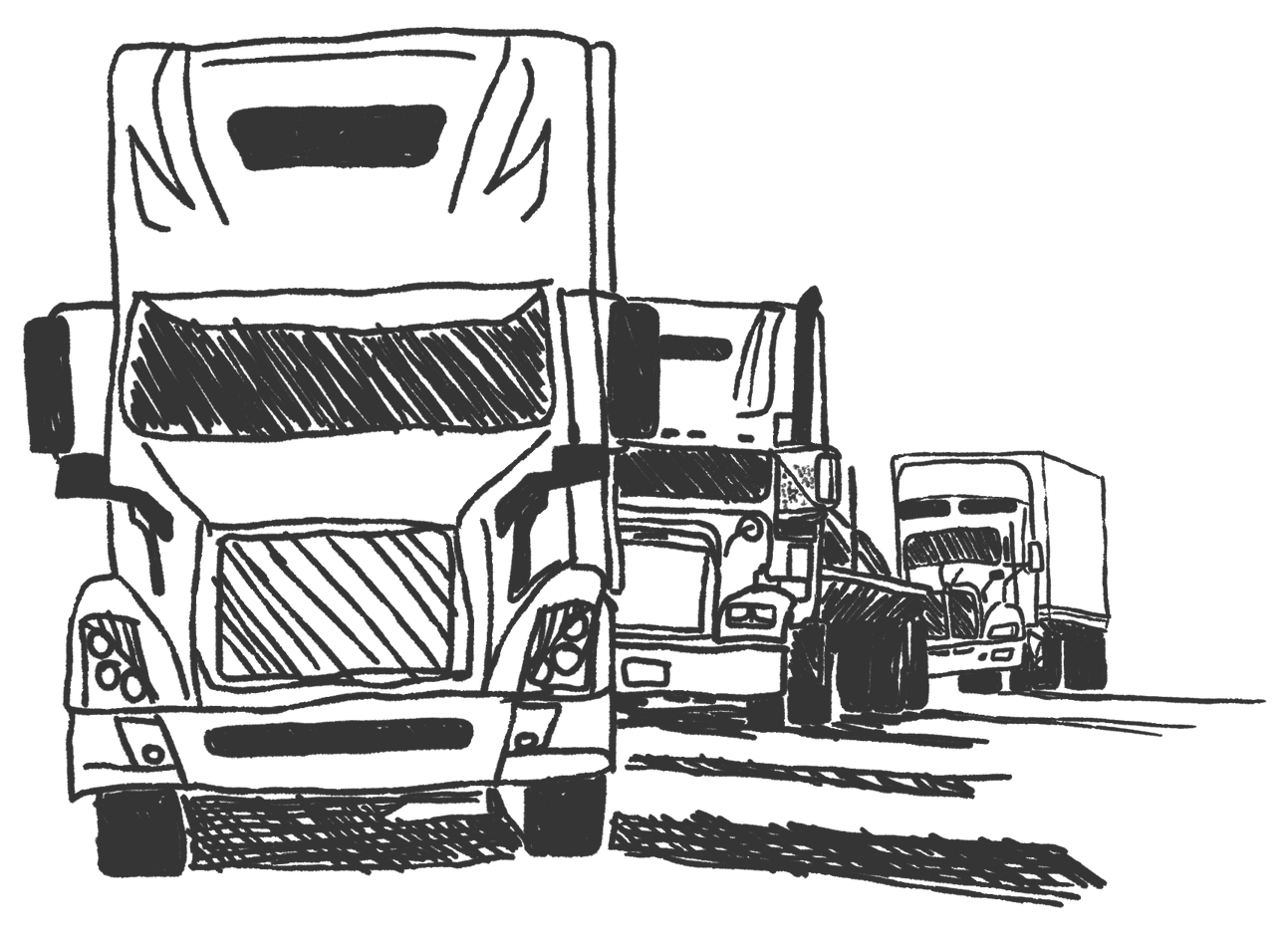Top Causes of 18-Wheeler Accidents in Midland: From Fatigue to Faulty Brakes
Midland, Texas, is located in the center of the Permian Basin, which is responsible for over 14% of the oil produced in the United States. While this economic boom creates an atmosphere of wealth, it has created deadly environments on the local roadways for 18-wheeler accidents. In Midland County in 2024, there were 502 accidents involving trucks. Of these, 12 fatal crashes claimed the lives of 13 people. These car crashes, often based on preventable behavior, become only worse with the pace of work driven by the oil industry. At A2X Law, our team handles catastrophic injury cases and personal injury cases nationwide. We represent individuals who have been involved in accidents with 18-wheelers or large trucks. Contact us at (361) 452-1279 to explore your legal options.
Why 18-Wheeler Accidents Surge in the Permian Basin
The Permian’s transportation infrastructure, such as U.S. 285 and State Highway 349, accommodates more than 10,000 trucks daily, transporting sand, water, and crude oil. These narrow, pothole-filled roads, which become increasingly less navigable due to the impacts of dust storms and heavy semi-trucks, are twice as likely to result in fatal crashes compared to the rest of Texas. In Texas, there were 38,909 truck accidents in 2024 (465 fatal), and nearly half of those traffic fatalities were in the Permian region. Below, we examine the five most common causes of truck wrecks, based on data from TxDOT and the oilfields in Midland, to provide information that helps drivers be safer and victims pursue justice.
1. Driver Fatigue: Exhaustion from Relentless Oilfield Schedules
Fatigue is a significant factor in 18-wheeler accidents due to the harsh demands of the oil industry, which push truck drivers to their limits. Midland truckers frequently work days of 15 to 20 hours for weeks. However, federal regulations limit driving to 11 hours after 10 hours off-duty. This exhaustion triggers “microsleeps” or delayed reactions, comparable to drunk driving, contributing to up to 20% of commercial crashes, with even higher rates in high-pressure zones like Midland. Fatigue is especially deadly on rural routes where quick reflexes are critical to avoid collisions with overloaded rigs.
2. Speeding: Rushing to Meet Tight Deadlines
Speeding is a significant factor in 18-wheeler accidents, accounting for approximately 45% of fatal truck crashes in energy regions, such as the Permian. An 80,000-pound rig needs two football fields to stop at highway speeds, and the oil industry’s tight schedules push drivers to exceed limits on Midland’s rural roads. These roadways, which are frequently small and uneven, put surrounding passenger cars at risk of rollovers or jackknifes when trucks speed to carry crude oil or fracking supplies.
3. Impaired Driving: Substances in a High-Pressure Industry
Impaired driving, whether by alcohol, drugs, or prescription medications, contributes to roughly 20% of Texas semi accidents. The Permian’s long hauls and isolated routes drive some truckers to use substances to stay alert, impairing judgment and slowing reflexes. This is particularly dangerous in Midland, where heavy truck traffic and rural road conditions demand full attention. If a trucking company doesn’t ensure compliance with Texas DWI laws or FMCSA drug-testing requirements, it could expose itself to severe liability for violations of those laws.
4. Poor Maintenance: Neglected Trucks on Worn Roads
Inadequate brakes, tire blowouts, and a failure to inspect account for about 35% of all accidents involving 18-wheelers. Because oil companies typically place more emphasis on delivery schedules than adequate fleet maintenance, many trucks on Midland’s rural roads with heavy loads increase wear and tear on components, resulting in minor problems developing into catastrophic failures. Failure to comply with FMCSA maintenance requirements is typically negligence that results in an otherwise preventable accident/leaving trucking companies and/or manufacturers culpable for injuries or loss.
5. Distracted Driving: Multitasking in Heavy Traffic
Nearly 1 in 5 Texas collisions are caused by distracted driving, texting, modifying GPS, or keeping track of delivery logs; in 2024, these behaviors resulted in 373 fatalities and 2,587 serious injuries. Distractions are hazardous for Midland 18-wheeler drivers when they are near large truck stops or on crowded roads like I-20, where multitasking diverts attention away from navigating heavy traffic. The significance of hands-free policies is emphasized by TxDOT's "Talk. Text. Crash." campaign. However, in the fast-paced world of the Permian, diversions continue to pose a hazard.
The Lasting Impact: Devastating Injuries and Community Costs
In 18-wheeler collisions, passenger cars suffer the most, leading to disastrous fuel-related outcomes. Medical expenses for wrongful deaths, spinal damage, and traumatic brain injuries can amount to hundreds of thousands of dollars. Midland’s 502 truck crashes in 2024 burdened hospitals and families, resulting in millions of dollars in economic losses from healthcare and lost productivity. Despite a 5.8% drop in fatalities from initiatives like TxDOT’s HERO program, the Permian still accounts for 10-12% of Texas road deaths with just 2% of the population.
Staying Safe: Tips for Navigating Midland’s Truck-Laden Roads
- Avoid Blind Spots: Stay clear of a truck’s “no-zones” where drivers can’t see you.
- Keep Extra Distance: Allow ample space for rigs’ long stopping times, especially on curves.
- Report Road Hazards: Alert TxDOT to potholes or debris that worsen rural road risks.
- Drive Defensively: Stay alert during peak oilfield hours (dawn to dusk) for fatigued or speeding trucks.
A2X Law: Advocates for 18-Wheeler Accident Victims
At A2X Law, we represent Midland residents who were injured in 18-wheeler accidents. Our team is experienced in investigating oilfield-related cases, including fatigue logs, vehicle maintenance, and driver violations, to hold the trucking company, the driver, and the insurance company accountable for their actions. Texas is an at-fault state; therefore, we seek compensation for medical expenses, lost wages, physical and emotional pain and suffering so our client can receive the justice they deserve. Please contact us today at
(361) 452-1279 to learn how we can support your recovery.
Request a Consultation
Other Practice Areas





